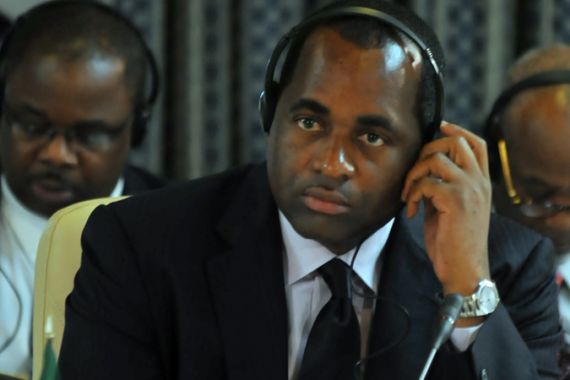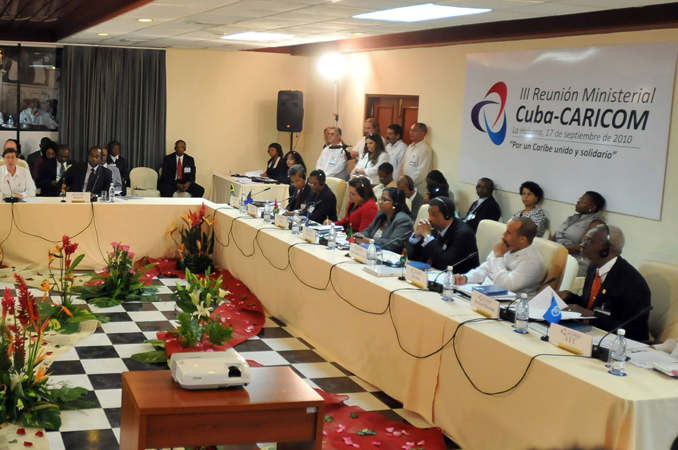Libyan investments in Caribbean under threat
Leaders of some Caribbean nations are concerned that turmoil 9,500 km away could affect banking and hotels.

 |
| Some Caribbean political leaders are being criticised for maintaining business relationships with Gaddafi [EPA] |
Member states of the sub-regional Organisation of Eastern Caribbean States (OECS) have adopted their own lines of engagement with Libya, much to the concern of some opposition parties.
The main concern – what will become of Libyan investment projects in region?
“Whether we like it or not, we’re still very much dependent on oil from the Middle East and most of our economies are driven by that,” said prime minister Baldwin Spencer of Antigua and Barbuda. “To the extent that there is instability and war and so on, it has an impact.”
As leaders of the OECS member states anxiously await the outcome of several negotiated agreements with Libya – including the opening of a Libyan embassy in St. Lucia and a bank in St. Kitts – Spencer admitted that he is nervously watching developments in the North African country.
In the midst of the unrest in Libya, leaders in the region have found themselves caught between the proverbial ‘rock and a hard place’.
Many of St. Vincent and the Grenadines’ major development projects in recent years have benefited from Libyan funding. The opposition in St. Vincent and the Grenadines has criticised prime minister Ralph Gonsalves’ government for accepting what opposition leader Arnhim Eustace describes as “blood money”.
Gonsalves defends his government’s receipt of the aid. According to the prime minister, the $250,000 handed over to the Housing and Land Development Corporation (HLDC) by Libya’s ambassador to the OECS, Ammat Ali, in February are to aid with rebuilding the country after the damage wrought by Hurricane Tomas last year.
“You know, that is blood money! That is blood money!” declared Eustace during a rally held to whip up support for a protest march against two controversial bills that were being taken to parliament. “I want Ralph to tell the people of St. Vincent and the Grenadines… what is his position now about [Libyan leader Muammar] Gaddafi,” said Eustace.
In nearby Dominica, prime minister Roosevelt Skerrit reiterated his government’s position that Dominica will not break ties with Libya because of the ongoing political turmoil.
“Why should we terminate relations with Libya,” said Skerrit, who also questioned the opposition’s call for him to simply review his existing relationship with Tripoli.
The same stance has been taken by prime minister Stephenson King of St. Lucia, who said while his government is monitoring developments in Libya, they were not severing diplomatic relations.
St Lucia’s foreign minister Rufus Bousquet says the march to democracy in the Middle East and North Africa is likely to impact on investment projects in the OECS sub-region. “St. Lucia was right in the middle, among other countries in the OECS as a sub-regional grouping, and we were well on our way to establishing, certainly with Libya, an investment bank and investment fund both of which were funded to the tune of $100m from the Libyan government,” Bousquet says.
Grenada has also found itself in a similar position – that of anxiously awaiting financial aid.
Last year, the government of Grenada announced that it was expecting a grant of $1.9m from Libya for public works projects, in addition to expecting Libya to forgive a $6m debt.
The ties with Libya and OECS member states have been the source of controversy for years.
In 2001 some Caribbean leaders visited Libya in search of technical and monetary aid to help modernise their agricultural sectors. That visit was arranged because of a dip in aid from the United States and Britain.
Then prime minister of Trinidad and Tobago Basdeo Panday warned the trip might harm Caribbean relations with Washington and London. In the midst of the controversy surrounding the visit, the leaders of St. Kitts and Nevis and Antigua pulled out.
According to journalist Jerry George, who is based in St. Vincent and the Grenadines, the Caribbean’s relationship with Libya could best be described as opportunistic.
“So far no one has said a word in support of the peoples whose monies we have so eagerly accepted in the past. These monies are treated as if they come from the personal coffers of leader Gaddafi, and not the people on whom he has turned his guns,” George stated.
Calvin G. Brown is a consultant on Caribbean Community (CARICOM) relations who notes that the position taken by the nations of the OECS in relation to Libya has very little, if any, to do with ideology.
“Rather, it has everything to do with economics. The United States of America as well as Britain are well aware that no amount of assistance from Libya can in any way harm the historically strong relations between the nations of the Caribbean and themselves,” Brown said.
“CARICOM, while taking a principled position, also has to be pragmatic and keep a still tongue,” Brown added.
As the unrest escalated in Libya, the CARICOM heads of government met in Grenada. However, the communique emanating from that meeting could not have been more non-committal – it called for peace in the Middle East and North Africa without mentioning Libya by name.
This article first appeared on the Inter Press Service news agency.